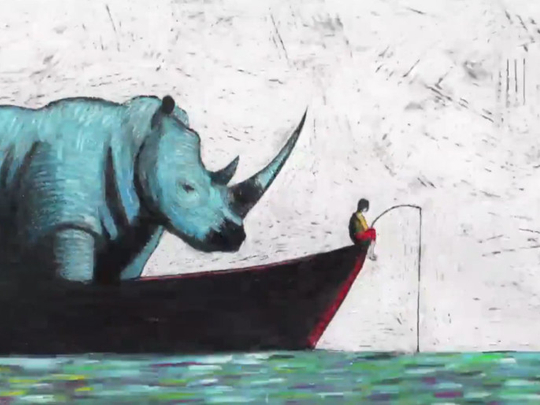
Filmmaker Zhao Liang on Friday unveiled a vision of China’s industrial wastelands inspired by the Italian poet Dante’s nightmarish depiction of hell.
But the Chinese documentarist said he did not anticipate any problems with authorities in Beijing in the latest of a series of groundbreaking films that cast the country’s governance in anything but a flattering light.
Shown for the first time at the Venice Film Festival, Zhao’s Behemoth chronicles the devastating impact that open cast mining in the autonomous northern region of Inner Mongolia has had on the landscape and the environment, and on the health of miners and ironworkers drawn to the region seeking work.
Part-documentary, part-allegoric narrative with dream-like sequences, the 90-minute film offers an unsettling glimpse of the noxious side-effects of China’s modernisation that will cement his reputation as one of the country’s most courageous and critical independent filmmakers.
“I don’t think I will be prevented from returning home, China is not Iran,” he said. “We are not at that level, we are talking about an artistic work after all.
“What I wanted to do was to expose a global situation. The same thing exists in the United States or Canada. Inner Mongolia is only one example among others.”
In focusing on events at the periphery of China’s vast territory, Behemoth has some echoes of Zhao’s 2007 Crime and Punishment — an indictment of a dysfunctional judicial system seen through the prism of a shambolic police unit in a small town on the border with North Korea.
In Petition (2009), Zhao followed provincial peasants battling bureaucracy over a 12-year period in the run-up to the Beijing Olympics, and in 2010 he documented the shortcomings of China’s care for people with Aids in Together.
‘All part of the monster’
In his latest work, produced with the backing of Franco-German art channel Arte and France’s National Audiovisual Institute, Zhao said he wanted to portray how the pursuit of prosperity had triggered “the growth of an enormous evil energy” in which all sections of society have colluded.
“We all have seen the catastrophic consequences of fuel politics,” he said in his director’s notes.
“As some of us are enjoying a more and more luxurious lifestyle, shouldn’t we reflect on that way of life?
“We all are consumers of natural resources, so we are all accomplices of that evil that’s hurting the environment. All of us are part of the monster.”
Having come across the mines by chance on a road trip across China, Zhao spent two years filming in the region, allowing him to construct a record of green grasslands becoming smothered in ash, leaving herdsmen with no option but to move on.
Since much of the activity at the mines is illegal, filming there was a hit-and-run affair, “like we were fighting a guerrilla war,” Zhao said.
Inside the ironworks, it was so hot that within minutes, his camera was transformed into a hand-burning lump of metal.
‘Returning to hell’
Such experiences led to a chance connection with the work of 14th Century Italian writer Dante Alighieri, whose epic poem The Divine Comedy imagines the afterlife as being divided into hell, purgatory and paradise.
“Every time I returned to shooting I always said to my producer Sylvie Blum that I was going back to hell,” Zhao recalled.
On inspecting the visuals, Blum was struck by the extent they matched Dante’s “inferno” descriptions and, on her suggestion, the filmmaker acquired a Chinese copy of the text.
“I was stunned by how perfectly the environment described in Dante’s writing from eight centuries ago matches the reality today,” he said.
Inspired, Zhao set about incorporating Dante’s phrases and ideas into his film.
“I used the redness seen in the ironworks to represent ‘Inferno’ (Hell), the greyness created by the dust after a running truck to represent ‘Purgatorio’ (Purgatory), and the surreal blue of the sky in the ghost city of Ordos to represent ‘Paradiso’ (Heaven),” he said.
Behemoth was the last but one of the 21 films shown in the main competition.
The Naples-set drama Per amor vostro completes the selection on Friday night and the winner of the Golden Lion will be announced on Saturday.
Russian director Alexander Sokurov’s Francofonia, and Desde alla, a debut feature by Venezuelan Lorenzo Vigas, have been tipped as frontrunners for the top prize but Venice juries are notoriously unpredictable in their selections.














